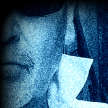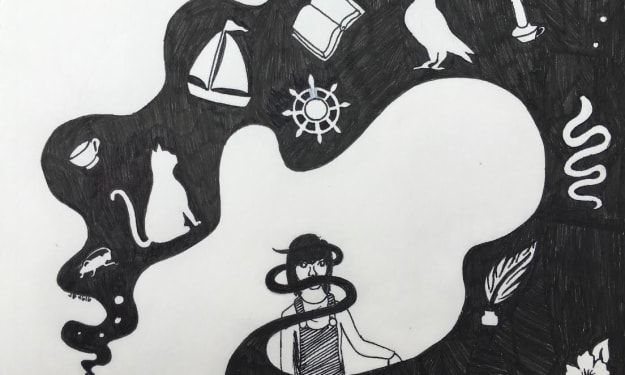
Willow Arrows © David Philip Ireland, All rights reserved
I wonder if he knew I was coming.
I don’t expect he did.
In the villages of the Forties, babies came and went with the harvesting of cabbages, the arrival of Doctor O’Dowd, the cackle of storks.
Poor Johnny - lifted smartly like a chess piece from his unassailable position, to be dropped into second place - the classic case of checkmate.
There are photographs of the two of us, mere months later, in spring sunshine. His quirky Norman Wisdom smile resting on my Shirley Temple curls.
My first memory was of a January day at fifteen months. We sat cramped together on the front seat of the Townsends lorry dad had borrowed, our things bouncing precariously behind us. The lorry smelled of corn and sweet pig meal. We held Snowy on our laps, bumping over bridges, feeling our tummies rise and fall, claws sinking deep. We had left harsh words and tears behind us.
The new house at eighty-one stood aloof from the unfinished shells running from eighty-five to bleak cement horizons. Everywhere was sand. Coarse white builders sand. How it flurried as the street kids roamed. Like summer snow.
I was alone. Aboard the raft of my future, on the shore of alienation. Johnny stood firm. He untied my moorings and watched with glee as I drifted away, hopelessly beyond their reach He had found his band of pirates. He was home and dry.
They scrogged, they cherry-knocked and they did unnamed things on Snake Island. I went to Sunday School with a hair grip holding back my fine, blond hair. I sported a Home Service accent, buttoned my coat on the girls’ side, and stared at the neighbours in dumb insolence. Johnny, frustrated by his own shortcomings lashed out at me in secret, devious ways.
Johnny always went to school late.
I always went in tears.
No one explained the rules. Mother left me stranded there at five years old. Two buttered digestives in a greasy bag. Shipwrecked. My raft in driftwood splinters.
But that summer holiday was a reverie of comics and sleepy beds and endless days alone.
Once I tagged along behind him.
Bliss.
We teetered on the edge of locks, rolling fish-bait. Minnows and sticklebacks thrashed greedily, scattering the pungent pondweed. Johnny prattled on, his warm burr full of the promise of Elvis, Teds and Quiffs. A good day. Trapped forever like a wasp in amber.
We crossed the road and passed the dry stone wall into the yard of Manor Farm. The soporific perfume of cattle and hedge flowers led us to the canal, a mile downstream from the disused lock. Over the high Cotswold stone wall, we could see the leaded windows of the Manor itself, all pale stone and ivied gables. We found the willow coppice with its flat, bare clearing just beyond the wall and through the railway arches. An island in a sea of nettle breakers.
I don’t remember words, but there would have been: ‘you be this an’ I’ll be that’.
Johnny delved into the depths of his knee-length flannel trouser pockets for a roll-up, some twine, and a penknife. He lit up, then flipped opened the knife with one practiced move. Then he set to work
‘Here - look what I’ve made!’
Triumphantly he held the withy bow and arrow high in the air. With a whoop, he danced his little war dance. Tiny clouds of pollen flew around him. Smoke signals. He chased me. It was delicious. Just two kids who might have been friends. Two estate kids at play, far from the confines of our beleaguered brotherhood.
The sharpness of the pain startled me and I froze in mid-step.
‘Oh, bloody hell, our kid!’.
I knew his thoughts. What would SHE say! We both stared in horror at the withy. It had entered my calf, just below the knee, re-emerging slightly lower. It went clean through the flesh. If there was blood I don't remember. If there was pain, it was the sting of the belt he would feel. Johnny fell before me to examine the withy.
‘Bloody hell, our kid - it’s gone right through yer bloody leg!’
It had. I looked down at my leg in disbelief.
’We’ll ‘ave to get it out
That was the nasty bit. But I don’t remember blood. The arrow protruded like a trick shop novelty. I flinched. His sobs of stupidity and regret stilled me.
‘I'm sorry, our kid, I’m sorry!’
He held my ankle tight in his grubby grip. His other hand grasped the arrow resolutely and he pulled. Slowly, so slowly. He laid the stripped withy solemnly in my open hand. He squatted before me, bright tears in his eyes. He searched for unknown words. Here we could forge the unassailable bond of brothers in blood.
For seconds we shared that gaze. Then, swiftly the look changed.
Realisation dawned.
The real mates, the Snake Island girls, the ciggies and cokes in the Green Cafe, Red River Rock, and the Brylcreem odour of quiffs oozed back into his mind.
No sniveling kid was worth the loss of face, the admittance of love. No, this was a coming of age. Trouble would come anyway. Make it worthwhile. First blood.
'Don't tell our mum’.
I tried hard to limp, but I was unsure which foot should lead, so I ran with him. We raced like the wind toward the pale grey past. He stormed upstairs to his sweaty socky side of our shared bedroom and closed the door. Saturday slept by and Johnny tossed and turned in his bed. Sunday dinner and he arrived sullen and uncommunicative, drumming Heartbreak Hotel on the oilcloth.
The world seemed oblivious to the subtle shift in the scheme of things, but that willowed instant divided our lives as clearly as the folds of a map.
***
I had no idea he was coming.
We hadn’t been in touch for so many years. In desperation, I looked out toward the glorious pinks and oranges of the sunset. From hilltops and roof gardens and balconies, lovers sighed and basked in the diffusion of colour. Those last dying fingers of light drew me too - not toward love, but to peace, hovering in half-life.
The end simply accepted.
High on the pale stone I was unaware of his bursting pride, of his desire to tell me. Of all the places he could have gone, he chose to be with me. So many splinters of moments fused together.
The harsh clamour of the doorbell shot through me like an arrow, jolting me back. The sun fell away behind the distant May and blacked out. The six flights of stairs I would not have used again flew under my feet.
There he was.
We raced like the wind toward the pale grey Anglia, his new license proudly displayed on the dashboard. I accepted his No 6 with a shaking hand.
We raced like the wind toward the pale grey Severn, bright stars in his eyes.
Two kids who might have been friends.
Sharing brief moments of time
About the Creator
David Philip Ireland
David Philip Ireland was born in Cheltenham in 1949
David has published work in music, novels and poetry.
To discover David’s back catalogue, visit: linktr.ee/davidirelandmusic






Comments
There are no comments for this story
Be the first to respond and start the conversation.